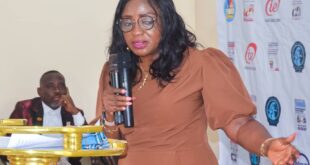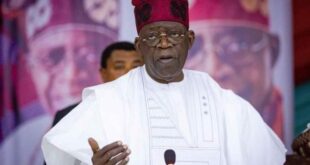The All Progressives Congress (APC) will elect a new set of its national executive committee on Saturday.
About 6,000 delegates to the national convention holding in Abuja will elect 42 men and women to steer the affairs of the ruling party for the next four years.
Of the number, 20 have been returned unopposed, leaving 22 positions up for grabs. One of the positions that will not be contested for is that of the national chairman.
The immediate past governor of Edo State, Adams Oshiomhole, is set to take over the office from his fellow Edo indigene and indeed former governor, John Odigie-Oyegun.
This is because the three other contestants who earlier signified their intention to seek the office have all stepped down and endorsed Mr. Oshiomhole.
The three erstwhile aspirants are a former governor of Edo State, Oserheimen Osunbor; a former governor of Cross River State, Clement Ebri; and Ibrahim Emokpaire.
Mr Oshiomhole is expected to assume office as new APC chairman by Monday, June 25. His emergence is made possible after he was endorsed by President Muhammadu Buhari.
The 66 years old Oshiomhole completed two terms as governor of Edo in 2016. Before his emergence as governor, he led the Nigeria Labour Congress (NLC) as its president. It is said that he presided over the Congress in a most tumultuous time as his leadership confronted the then President Olusegun Obasanjo administration on various issues, including the price regime of petroleum products.
He is rated by some as one of the best presidents in the history of the labour union, and is reputed to have organisational skills. Mr Oshiomhole won the governorship election in Edo on the platform of the defunct Action Congress of Nigeria (ACN); before the party, alongside some opposition parties, formed the APC in 2013.
He became governor following a verdict of the Court of Appeal which held that the results of the April 2007 governorship election in the state were massively rigged in favour of the candidate of the then ruling Peoples Democratic Party (PDP), Oserheimen Osunbor.
He assumed office on November 12, 2008 after the court verdict.
To become sole candidate for APC chairmanship, Mr Buhari got the governors to queue behind Mr Oshiomhole for the coveted party seat. He is also believed to be enjoying the support of a national leader of the APC, Bola Tinubu, who last year demanded the resignation of Mr Odigie-Oyegun.
However, long before the president threw his support behind Mr Oshiomhole, some of the governors had since 2016 when he was about to round off his gubernatorial tenure begun to root for him to lead the party.
At Mr Oshiomhole’s formal declaration in Abuja some weeks ago, the governors were represented by the chairman of the APC Governors Forum, Rochas Okorocha. Mr Oshiomhole’s chances brightened when Mr Odigie-Oyegun backed down from his plan to seek reelection.
Mr Oshiomhole has promised to reposition the party.
He was born on April 4, 1952 at Iyamho, near Auchi in Edo State.
He was born a Muslim but was led to Christianity by his late wife Clara, who died of cancer at the age of 54. He is Catholic and his Christian name is Eric.
After his secondary education, he obtained a job with Arewa Textiles Company, where he was elected union secretary. He became a full-time trade union organiser in 1975. He then studied at Ruskin College, Oxford in the UK where he studied economics and industrial relations. He also attended the National Institute for Policy and Strategic Studies, Kuru, Plateau State. In May 2015, he married a young model called Iara Fortes.
Life As Labour Leader
Mr Oshiomhole was appointed General Secretary of the National Union of Textile Garment and Tailoring Workers of Nigeria, in 1982, a union with over 75,000 workers.
After democracy was restored in 1999, he became president of the NLC. Early in the administration of President Obasanjo, he negotiated a 25 per cent wage increase for public sector workers. In return, he publicly supported Mr Obasanjo and endorsed his candidacy when he was re-elected in 2003.
The textile union elected Mr Oshiomhole for a second term as general secretary, while he continued as president of the NLC.
The relationship with President Obasanjo turned sour as neglect of local oil refineries led to reliance on imported petrol, followed by rises in the price of the product. Mr Oshiomhole led strikes and demonstrations against the increases. He faced arrests, tear gas and temporary blockades of union offices, and Mr Obasanjo introduced legislation to make it more difficult for the NLC to strike.
The NLC alleged that on October 9, 2004 Mr Oshiomhole was abducted by State Security Services (SSS), during a protest, but the Nigerian government at the time said he submitted voluntarily to custody.
Mr Oshiomhole represented African workers for two terms on the governing body of the International Labour Organisation (ILO), serving on the committee on freedom of association. He was also a member of the Executive Board of the International Confederation of Tree Trade Unions.
Subscribe to the Advocate News letter and receive news updates daily in your inbox.
 Advocate.ng Latest news update on politics, entertainment, sport and more
Advocate.ng Latest news update on politics, entertainment, sport and more




